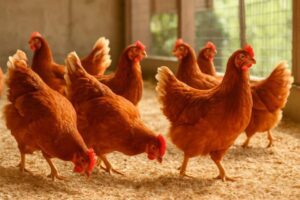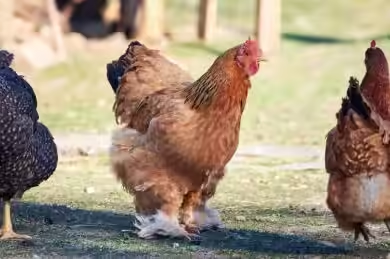Last updated on August 15, 2025
Are you tired of the constant worry and expense of sick Noilers? Do you wish there was a way to raise a healthy, thriving flock without always needing medications? This guide is for you. It reveals how to achieve robust Noiler chicken health naturally, significantly reducing your reliance on medications through proven preventative strategies and expert insights, leading to healthier birds, fewer vet bills, and less stress on your farm.
1. Is It Really Possible to Keep Noilers Healthy Without Lots of Drugs?
Yeah, it really is! Keeping your Noiler chickens healthy and thriving without constantly reaching for the medicine bottle is absolutely doable. Many folks raising Noilers find themselves wondering, “How to care for Noiler chicken?” in a way that minimizes illness. And honestly, it’s a valid question!
We’ve all seen how quickly sickness can spread through a flock. But here’s the good news: by focusing on foundational principles, you can drastically cut down on disease outbreaks. Think of these as the bedrock of Noiler chicken health.


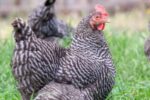

This means less stress for you and healthier birds, naturally. If you’re just starting out, getting a handle on how to start Noiler chicken farming with just 10 birds is a great first step. Understanding the potential disadvantages of Noiler chicken upfront also helps you prepare.
It’s not about never using medication, mind you. Sometimes, it’s necessary, and we’ll touch on that later. But the goal here is to build such a strong defense system for your birds that disease just doesn’t get a foothold easily.
We’re talking about creating an environment where they can thrive. This also means boosting their natural immunity and spotting potential issues before they become big, scary problems. This approach is key to prevent poultry diseases naturally.
Think of it like this: just like we humans stay healthier with good food, clean water, and less stress, our Noilers do too! Simple steps, consistently applied, are way more powerful than you might imagine. This is especially true when it comes to chicken disease prevention.

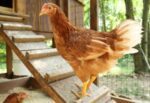

And guess what? Many of these steps are surprisingly simple and cost-effective. It’s a big part of what makes Noiler chicken farming profitable in Nigeria when done right.
Why Go the Natural Route for Noiler Health?
Choosing to reduce antibiotic use poultry farming isn’t just a trend; it’s becoming a necessity and a preference. This is true for many consumers today. Plus, relying less on drugs can actually make your flock stronger in the long run.
When birds are constantly exposed to low levels of antibiotics, resistant strains of bacteria can develop. This makes future treatments less effective. By focusing on natural chicken care, we’re building a more robust, resilient flock.
This flock can better handle challenges on its own. It’s about supporting their inherent ability to fight off pathogens. Understanding the 9 powerful advantages of raising dual-purpose Noiler chickens can really highlight why this effort is worthwhile.



Moreover, there’s a growing market and demand for poultry raised with minimal or no antibiotics. This approach aligns well with organic poultry keeping principles. It potentially opens up new markets or allows you to command a premium price if that’s your goal.
But even for backyard flocks, the peace of mind knowing you’re providing the best, most natural life for your birds is priceless. So, how do we actually do this? What are the actionable steps we can take right now on our farm? Let’s dig in! Avoiding common mistakes that make Noiler farmers lose money often starts with good health management.
2. Biosecurity and Hygiene: Your First Line of Defense
Okay, so you’re ready to roll up your sleeves and get serious about raising Noilers the natural way. Where do we even start? If you ask me, the absolute non-negotiable first step, the bedrock of everything we’re trying to achieve here, is bulletproof biosecurity. Seriously, this is your farm’s immune system!
What’s the Big Deal About Biosecurity on Your Noiler Farm?
The big deal about biosecurity is that it’s your farm’s immune system. It prevents diseases from even getting onto your property in the first place. Biosecurity refers to the set of measures taken to prevent the introduction and spread of disease agents onto and within a farm.


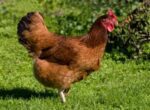

Think of biosecurity poultry farm practices as building an invisible fence around your flock. Because, let’s be honest, it’s way easier to keep a disease out than to get rid of it once it’s settled in. And this is a huge part of how to keep Noilers disease-free without using too many drugs. If the pathogens aren’t there, you don’t need the medicine!
So, what does this look like in practice? Here are some key biosecurity steps:
- Control Access: Limit who comes onto your farm and where they go. Consider footbaths and protective clothing for necessary visitors.
- Quarantine New Birds: Always isolate new birds for a couple of weeks away from your main flock to observe for any signs of illness.
- Disinfect Equipment: Clean and disinfect any shared tools, crates, or vehicles before they enter your farm or move between different areas.
According to a systematic review and meta-analysis published in 2024, biosecurity measures related to visitors and farmworkers were effective at reducing the risk of introducing and spreading avian influenza viruses in African livestock farms. See? It really works!
Is Just Keeping Things Clean Enough for Chicken Coop Hygiene?
Absolutely not just enough, but it’s incredibly vital! Maintaining impeccable hygiene within the coop is your next major battlefront in how do you control poultry diseases. A clean environment directly reduces the number of pathogens your birds are exposed to daily. Think of the coop floor, the feeders, and especially the waterers. These spots can become breeding grounds for bacteria and parasites if not cleaned regularly. Having the right poultry farming equipment can make this much easier.



Here’s a simple hygiene checklist:
- Clean waterers daily.
- Clean feeders regularly to prevent mold and buildup.
- Regularly clean and disinfect the coop itself.
- Manage litter properly (more on this below!).
I make it a point to clean waterers daily. Why? Because contaminated water is a superhighway for disease transmission. Feeders need regular cleaning too, preventing mold and bacterial buildup. And the coop itself? Regular cleaning and disinfection are non-negotiable for good chicken coop hygiene. This doesn’t mean you need harsh chemicals all the time, but a good scrub and appropriate disinfectant used correctly make a massive difference. Keeping the litter managed properly, which we’ll talk about later, is also part of this hygiene puzzle. It’s about minimizing the enemy’s numbers right where your birds live.
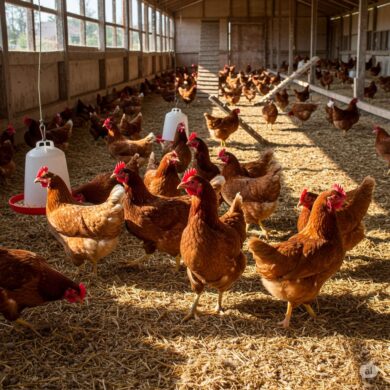
Does Where They Live Really Matter That Much for Their Health?
You bet it does! Providing optimal housing isn’t just about shelter; it’s fundamental to keeping Noilers happy and healthy. This, in turn, helps them fight off disease. We’re talking about adequate space, good ventilation, and protection from the elements.
Overcrowding is a huge no-no. When birds are crammed together, stress levels skyrocket, and diseases spread like wildfire. Giving them enough room to move around freely is crucial for their well-being and helps manage ammonia levels from droppings.


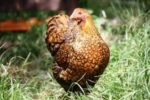

Proper ventilation is also key. It helps remove moisture, ammonia, and dust from the air. All of these can irritate birds’ respiratory systems and make them more susceptible to illness. You want fresh air circulating without creating drafts.
And naturally, they need protection from harsh weather. This includes scorching sun, heavy rain, or cold winds. A comfortable, stress-free living space is a cornerstone of a strong immune system. It makes your Noilers naturally more resistant to disease. It’s all interconnected, isn’t it? Happy birds are healthy birds!
3. Feeding for Health: Nutrition and Natural Support
So, we’ve covered the importance of keeping their environment clean and secure. But what about what goes into our Noilers? Just like with us, what they eat and drink plays a massive role in their ability to stay healthy and fight off illness. It’s not just about growth; it’s about building a resilient body from the inside out.
Does Giving Them the Best Feed for Noilers Really Make a Difference?
Oh, absolutely! Providing a balanced, nutritious diet is absolutely critical for Noiler chicken health. High-quality feed, appropriate for their age and stage of production, gives them all the vitamins, minerals, protein, and energy they need. These aren’t just calories; they’re the building blocks for a strong immune system and overall vitality.



Think of it as fueling their internal defense force! Using the best feed for Noilers means they’re getting consistent, clean nutrition without unnecessary fillers or contaminants. Poor nutrition, on the other hand, is a major stressor. It also weakens their ability to resist disease.
Research consistently shows that well-nourished flocks have lower mortality rates and better disease resistance compared to those on inadequate diets (Source: SAS Publishers). It really is that fundamental. Proper nutrition is also key to how to make Noiler grow fast.
How Important is Clean Water, Seriously?
Clean, fresh water constantly is non-negotiable because contaminated water is one of the easiest and fastest ways for diseases to spread through your flock. If feed is the fuel, clean water is the oil! Bacteria, viruses, and parasites can all hitch a ride in dirty water.
Imagine drinking from a muddy puddle yourself – yuck! Your Noilers feel the same way. I make it a point to clean waterers daily and refilled with fresh, potable water. Simple, right? But this simple act is a giant leap in preventing waterborne illnesses and is crucial for overall Noiler chicken health. Don’t ever underestimate the power of clean water!



Can Stress Really Make a Chicken Sick?
You bet it can! Stress significantly impacts our feathered friends. It weakens their immune system and makes them more vulnerable to illness. Stress isn’t just a human problem; it significantly impacts our feathered friends too.
Things like overcrowding (we talked about that!), sudden changes in routine, rough handling, extreme temperatures, or even loud noises can stress them out. When a chicken is stressed, its body releases hormones that suppress the immune system. This makes them way more vulnerable to picking up whatever bug might be floating around.
Reducing stressors is a powerful, natural way to support their immune system support poultry needs and keep them healthier.
Here are some common stressors to minimize:



- Overcrowding
- Sudden changes in feed or routine
- Rough handling
- Extreme temperatures (too hot or too cold)
- Loud or sudden noises
Effective stress management chickens involves creating a calm, predictable environment. This includes giving them enough space, handling them gently, and trying to keep their daily routine consistent.
Wait, I Thought Vaccination Was a Drug?
That’s a great question, and it highlights a key point. Vaccination isn’t a treatment for a disease that’s already present. It’s a preventative measure, like getting a flu shot, that teaches the bird’s immune system how to fight off a specific disease. Vaccination involves introducing a weakened or inactive form of a disease agent to the bird’s immune system, building immunity without causing the full illness.
It exposes the bird’s immune system to a weakened or inactive form of a virus or bacteria. This teaches the body how to fight it off if it encounters the real thing later. Implementing a smart vaccination program against prevalent diseases in your area (like Newcastle Disease or Gumboro, which are common concerns here in Nigeria) is a critical part of a preventative health strategy.
It works alongside your natural health efforts. It provides a layer of protection without being a drug used to cure an active infection. It’s a tool to prevent the need for drugs later.
What About Natural Feed Additives Chickens Can Eat?
Okay, this is where things get really interesting in the world of alternative chicken medicine and natural chicken care! Beyond the basic feed, incorporating natural additives can give your Noilers an extra edge. I’m talking about things like probiotics and prebiotics.
Probiotics are beneficial bacteria, like the good bugs in yogurt. They help maintain a healthy balance in the chicken’s gut. Prebiotics are types of fiber that feed these good bacteria. A healthy gut is absolutely essential for proper digestion and, crucially, for a strong immune system. About 70% of a chicken’s immune cells are located in the gut (Source: PMC).
Adding these natural feed additives chickens can benefit from helps them absorb nutrients better. It also makes it harder for harmful bacteria to take hold. If you’re wondering how to improve chicken gut health naturally, incorporating these additives is a fantastic way to provide immune system support poultry needs without resorting to antibiotics or other medications. It’s a proactive step to enhance their natural defenses!
Some natural additives to consider:
- Probiotics (e.g., Lactobacillus species): These introduce beneficial bacteria to the gut, improving balance and enhancing immune responses (Source: Frontiers in Animal Science, 2025).
- Prebiotics (e.g., Fructooligosaccharides (FOS), Mannan-oligosaccharides (MOS)): These are fibers that nourish the beneficial gut bacteria, helping them thrive and outcompete harmful pathogens (Source: SciELO).
- Herbs (e.g., garlic, oregano, ginger): Some herbs have natural antimicrobial or immune-boosting properties that can be used preventatively or for mild issues. For instance, crushed garlic can be added to their water, or dried oregano can be mixed into their feed.
Recent research in 2025 continues to show the beneficial impact of probiotics and prebiotics on chicken gut microbiota, immunity, and performance. It highlights their potential as alternatives to antibiotics (Source: Frontiers in Animal Science, 2025).
4. Farm Management and Monitoring: Staying Ahead of Trouble
Alright, we’ve covered the birds’ environment, their diet, and some natural boosters. Now, let’s talk about managing the farm itself and keeping a watchful eye on your flock. These next steps are all about preventing external threats and catching any potential issues super early. This is key to how to keep Noilers disease-free without using too many drugs.
Why Worry About Pests and Rodents on a Chicken Farm?
Honestly, ignoring pests and rodents is like leaving the back door open for disease! These unwelcome guests – think flies, mites, beetles, rats, and mice – aren’t just annoying; they’re like tiny taxis for diseases! Rodents can carry Salmonella and other bacteria, contaminating feed and water. Darkling beetles, often found in poultry litter, can spread pathogens too (Source: Poultry Science).
Implementing effective pest and rodent control measures around your Noiler housing is absolutely essential. We’re talking integrated pest management poultry farms here, which uses a combination of methods (Source: University of Connecticut Cooperative Extension). It means more than just setting out a few traps.
It involves keeping the area around the coop clean and free of debris where they can hide. Seal up any holes or cracks in the building. Store feed in metal bins they can’t chew through. Monitor regularly for signs of their presence. By reducing their numbers, you significantly reduce the risk of them introducing or spreading disease. This helps you prevent poultry diseases naturally.
Does Managing Litter Properly Really Matter?
Oh, it matters big time! Wet or caked litter is a paradise for pathogens like bacteria, molds, and parasites (hello, coccidiosis!). It also produces ammonia gas. This is terrible for your birds’ respiratory systems. Poor litter quality stresses them out and makes them more susceptible to illness.
Ideally, you want your litter moisture content between 20% and 25% (Source: UGA Cooperative Extension). A simple squeeze test works: if a handful clumps tightly and stays in a ball, it’s too wet. If it crumbles easily but holds shape slightly, it’s about right. If it just falls apart, it might be too dry and dusty (which also causes respiratory issues!).
Good ventilation helps keep it dry. Removing wet spots daily and changing the litter when needed are key parts of good chicken coop hygiene. They are also vital for preventing disease outbreaks linked to poor litter conditions. If you’re looking for the best way to clean chicken coop litter, focusing on dryness and regular removal of wet spots is absolutely key. A dry coop is a healthy coop!
How Can Daily Monitoring Help Prevent Disease?
This might sound simple, but just spending a few minutes observing your flock every single day is one of your most powerful tools for early detection of illness. You get to know what’s normal for your birds. You’ll notice if someone is acting a bit off – maybe they’re less active, not eating or drinking, have ruffled feathers, or their droppings look weird.
Early detection is everything! Spotting the subtle signs of illness early allows you to intervene quickly. Often, this can be done with less aggressive methods, before a condition becomes severe and potentially requires stronger medication or affects the whole flock. It’s your chance to catch things when they’re just starting. This makes it much easier to manage and keeps you on track with how to keep Noilers disease-free.
Here are some key signs of a potentially sick bird to watch for during your daily monitoring:
- Lethargy or inactivity
- Loss of appetite or decreased water intake
- Ruffled feathers or a generally “unkempt” appearance
- Abnormal droppings (runny, bloody, or unusual color/consistency)
- Difficulty breathing, coughing, sneezing, or nasal discharge
- Swelling around the head or eyes
- Lameness or difficulty standing/walking
- Huddling away from the rest of the flock
Do I Need to Be an Expert on Common Noiler Ailments?
While you don’t need a veterinary degree, having a basic understanding of common Noiler diseases is incredibly helpful for identifying issues quickly. Knowing the typical symptoms of issues like coccidiosis (bloody droppings, depression (Source: Afrimash.com)), Newcastle Disease (respiratory distress, nervous signs (Source: Poultry Farm Guide)), or respiratory infections helps you figure out what might be going on when you spot a sick bird. This knowledge empowers you to determine the best initial course of action.
Sometimes, it might be isolating the bird and providing supportive care. Or perhaps using a mild, natural intervention if appropriate and safe. Understanding what you might be dealing with supports your goal of avoiding excessive drugs by guiding your early response. If you’re specifically looking for natural remedies for poultry diseases in Nigeria, knowing the common local ailments is the first step to finding appropriate natural support methods that might be available and traditionally used in the region.
What Should I Do If a Bird Looks Sick? Quarantine!
Okay, you’ve been monitoring, and you see a bird that’s definitely not right. Your immediate next step? Isolate that bird! Quarantine sick birds immediately. This is non-negotiable if you want to protect the rest of your flock.
Have a separate cage or pen ready for this exact purpose. Move the sick bird there, ensure it has food and water, and then figure out what’s wrong. This simple act can prevent a single sick bird from triggering a major outbreak. That outbreak could affect all your birds and potentially require extensive drug treatment. It’s a critical biosecurity step within your farm.
But When Do I Really Need to Call the Vet?
We’re focusing on natural methods and prevention, right? But let’s be clear: there are times when you absolutely must call a veterinarian for professional diagnosis and treatment. If you have multiple birds showing severe symptoms, if you suspect a highly contagious or serious disease like Newcastle Disease, or if a bird’s condition is rapidly worsening, you need professional help.
A vet can accurately diagnose the problem, which is crucial. They can also recommend the most effective course of action. Sometimes, that might involve medication, and that’s okay. Responsible raising Noilers means knowing when your natural methods aren’t enough. Professional intervention is necessary for the welfare of your birds and the health of your flock. Don’t delay seeking veterinary advice when faced with a serious health challenge.
Real-World Success: A Farmer’s Story
Let me tell you about Mama Ayo, a farmer I know in Oyo State. For years, she struggled with frequent illness in her Noiler flock, leading to losses and high vet bills. She felt like she was constantly giving them medicine.
But after attending a local workshop on natural poultry health, she decided to make some changes. She focused intensely on cleaning her coop daily. She also installed simple footbaths at the entrance and started adding crushed garlic and a local herbal mix to their water a few times a week.
She also paid closer attention during feeding time, noticing subtle changes in behavior. It wasn’t overnight, but gradually, she saw a huge difference. Her birds were more active, their droppings were healthier, and the constant cycle of sickness slowed down dramatically.
Mama Ayo still vaccinates and will call the vet if something serious comes up. But she’s proof that prioritizing hygiene, natural support, and keen observation can drastically reduce the need for drugs. This leads to a much healthier, more profitable flock. Her experience really highlights the power of natural chicken care in action.
An Expert’s View
“I’ve seen firsthand how a strong focus on preventative measures and good farm management can transform the health of a poultry flock,” says Dr. Adebayo, a veterinarian practicing in Oyo State. “While medications are vital tools when needed, empowering farmers with knowledge about biosecurity, hygiene, and natural immune support is key to building sustainable, healthy poultry operations and reducing reliance on pharmaceuticals. It’s a win-win for the birds and the farmer.”
Your Action Plan: 5 Steps for Tomorrow
Ready to take action and boost your Noilers’ health naturally? Here are 5 key things you can do starting tomorrow:
- Inspect and Clean Waterers: Make sure all waterers are clean and filled with fresh water. Do this daily!
- Observe Your Flock: Spend at least 10-15 minutes watching your birds for any signs of unusual behavior or appearance.
- Check and Manage Litter: Feel the litter in different spots. Remove any wet or caked areas and add fresh, dry material if needed.
- Review Biosecurity Basics: Think about who and what enters your farm. Are there simple steps you can take to reduce risk, like using a footbath?
- Consider Natural Additives: Research locally available probiotics, prebiotics, or beneficial herbs and plan how you might incorporate them into their diet.
Wrapping It Up: Your Path to Healthier Noilers
Look, keeping your Noilers healthy and productive without leaning heavily on drugs is completely within your reach. It’s a holistic approach that combines smart farm management, excellent hygiene, optimal living conditions, quality nutrition, natural support, vigilant monitoring, and knowing when to seek professional help. By focusing on prevention and creating an environment where your birds can thrive, you’re not just avoiding medication; you’re building a stronger, more resilient flock for the long haul. It’s a rewarding way to approach Noiler farming and contributes to healthier birds and potentially healthier food for you and your community. Implementing these strategies is one of the key 7 ways to boost profitability in your Noiler chicken farm.
Frequently Asked Questions (FAQs)
What is biosecurity and why is it important for Noilers?
Biosecurity refers to measures taken to prevent disease introduction and spread on your farm. It’s crucial for Noilers because it acts as your farm’s immune system, keeping pathogens out and significantly reducing the need for medications.
Can I rely only on natural methods for Noiler health?
While natural methods are powerful for prevention and support, it’s important to know when professional help is needed. For severe symptoms, suspected contagious diseases, or rapidly worsening conditions, you should always consult a veterinarian. Vaccination is also a key preventative measure, not a treatment.
How often should I clean my Noiler coop?
Regular cleaning is vital for good hygiene. Waterers should be cleaned daily, feeders regularly, and the coop itself needs regular cleaning and disinfection. Proper litter management, including removing wet spots daily, is also essential.
What are some common natural feed additives for chickens?
Natural feed additives like probiotics (beneficial bacteria), prebiotics (fibers that feed good bacteria), and certain herbs (like garlic or oregano) can support gut health and immunity. Probiotics and prebiotics help balance gut flora, while some herbs have natural antimicrobial properties.
How can I tell if my Noiler is sick?
Daily monitoring is key. Watch for signs like lethargy, loss of appetite, ruffled feathers, abnormal droppings, difficulty breathing, swelling, lameness, or huddling away from the flock. Early detection allows for quicker intervention.
What are your biggest challenges in keeping your Noilers healthy? Have you tried any natural methods that worked well for you? Share your thoughts or ask your questions in the comments below! Let’s learn from each other!
